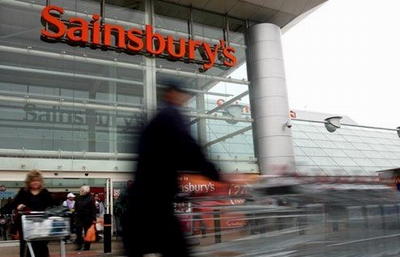
Britain's supermarkets are battling intensely for market share in tough economic conditions. Advertising is a major battleground.
Earlier this year, Sainsbury's complained to the Advertising Standards Authority (ASA) over market leader Tesco's "Price Promise" scheme.
The scheme compares the cost of a basket of Tesco's branded, own-label and fresh food against what it regarded as the same or equivalent products from Sainsbury's and other main rivals.
Sainsbury's argued it was unfair to compare own-brand items on price alone and not take account of provenance and other ethical issues.
It said it was wrong for Tesco to match products such as its "Everyday Value" ham, which is produced somewhere in the European Union, with Sainsbur's "basics" ham, which is British.
In July the regulator sided with Tesco. Sainsbury's appealed, but this month the ASA's independent reviewer Hayden Philips also ruled in Tesco's favor.
Sainsbury's, battling to be the UK's No. 2 grocer with Wal-Mart's (WMT.N) Asda in terms of sales, is now taking the case to a judicial review at the high court and expects a hearing in the summer of 2014, when it will present several hundred examples of what it regards as unfair product comparisons.
"This is a point of principle," commercial director Mike Coupe told reporters, noting it was the first time the firm had gone for a judicial review outside of property planning issues.
"We do not believe it is fair or reasonable to compare own label products because almost by definition they come from different sources," he said, adding that Sainsbury's was being backed by partner organizations Fairtrade, the Marine Stewardship Council (MSC), the Forest Stewardship Council (FSC) and animal welfare charity the RSPCA.
SCANDAL
Coupe said the firm particularly took issue with Tesco's assertion that for value-conscious customers ethical considerations do not play a part in purchasing decisions.
"This is incomprehensible because of Tesco's position on horsemeat, where they through their advertising have said publicly that sourcing credentials are important and yet through their price comparisons decided that it's less important or not important," he said.
Unlike Tesco and Asda, Sainsbury's was not implicated in a scandal over foods found to contain horsemeat when they were labeled as containing other meats.
Tesco dismissed Sainsbury's latest legal move. "Sainsbury's argument against Price Promise has been heard and rejected twice already," said Tesco's UK marketing director David Wood.
He said Tesco's scheme offered customers reassurance on the price of their whole shop, in store and online, not just on the big-brand products.
"When family budgets are under pressure, that is the kind of help customers want and the real question for Sainsbury's is why they aren't trying to do the same for their customers?"
Tesco launched "Price Promise" in March, comparing its prices with prices from Sainsbury's, Asda and No. 4 grocer Morrisons. If the comparison shows the basket would have been cheaper at a competitor, Tesco automatically issues a coupon for the difference up to 10 pounds ($16.13) when customers receive their shopping receipts.
Sainsbury's "Brand Match" scheme compares the prices of branded products only.
The advertising spat is the latest in a long list of disputes between the two grocers. Though Tesco overtook Sainsbury's as Britain's No. 1 retailer in 1995, Sainsbury's has performed better of late.
Tesco issued its first profit warning in over 20 years in January 2012, while Sainsbury has posted 35 consecutive quarters of like-for-like sales growth.





